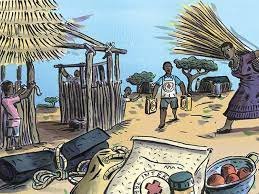In the small colony of Pakshirajapura, home to the nomadic tribe Hakki Pikki, resides Karanthai, a 23-year-old anganwadi teacher. Her daily routine revolves around caring for young children in her community. However, on this scorching afternoon, Karanthai’s mind was preoccupied with worry and anticipation. For the past 15 days, she had anxiously awaited the return of her mother, two brothers, and their wives from violence-stricken Sudan. The family had ventured to Sudan eight months ago to sell their traditional medicine, which had garnered significant demand. Unfortunately, their stay had coincided with a period of intense conflict and uncertainty.
Life in Sudan had turned into a nightmare for Karanthai’s family. Trapped in a rented house with limited provisions, they faced the harsh reality of survival amidst chaos. The violence and turmoil that engulfed the country left them fearing for their lives. Amidst the uncertainty, their meager supplies of food and water dwindled rapidly. The agonizing wait for their safe return became a daily ordeal for Karanthai, who carried on with her duties as an anganwadi teacher while her heart remained heavy with concern.
Finally, the long-awaited news arrived—a glimmer of hope in the form of her brother Manu’s voice. They had made it back, against all odds. His words resonated with gratitude for the support of their fellow tribespeople and the assistance provided by the government. Their journey had been fraught with peril, and the family knew they were fortunate to have survived. The relief that washed over Karanthai was overwhelming. Tears of joy streamed down her face as she realized that her family had emerged from the clutches of danger.
The Hakki Pikki tribe, known for their resilience and adaptability, rallied behind Karanthai’s family during their ordeal. The close-knit community offered support, pooling their limited resources to ensure the family’s well-being. Despite their own struggles, they exemplified the essence of unity and compassion, proving that in times of crisis, humanity triumphs over adversity.
The timely intervention of the government also played a crucial role in the family’s safe return. The authorities recognized the urgency of the situation and provided necessary aid and assistance. From coordinating their evacuation to ensuring their safe passage back home, the government demonstrated its commitment to its citizens, upholding the values of compassion and empathy.
As Karanthai resumed her daily routine as an anganwadi teacher, her heart overflowed with gratitude. She realized the value of the simple pleasures of life—food, water, and the security of her loved ones. The experience deepened her appreciation for her community, her profession, and the support of her government. It also strengthened her resolve to give back and support others in need, just as they had been supported during their darkest hours.
Karanthai’s story is a testament to the resilience of the human spirit. It showcases the power of unity, compassion, and the indomitable will to overcome adversity. As she returned to her role as an anganwadi teacher, Karanthai carried with her a renewed sense of purpose and gratitude. Her family’s safe return from Sudan serves as a beacon of hope, reminding us that even in the face of turmoil, there is always room for compassion, support, and the promise of a brighter tomorrow.


